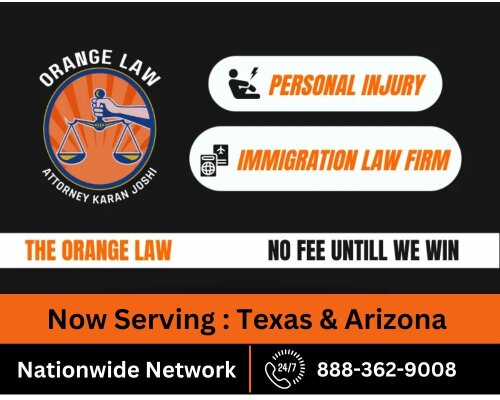Best Work Injury Lawyers in Houston
Share your needs with us, get contacted by law firms.
Free. Takes 2 min.
List of the best lawyers in Houston, United States
About Work Injury Law in Houston, United States
Work injury law in Houston is designed to protect employees who are injured while performing their job duties. These laws ensure that workers receive medical care, compensation for lost wages, and other benefits if they are hurt at work. Houston follows both Texas state laws and federal regulations regarding workplace safety and injury compensation. In most cases, employees may be entitled to workers’ compensation or may need to pursue a personal injury claim, depending on the specifics of their situation and whether their employer offers workers’ compensation coverage.
Why You May Need a Lawyer
Work injury cases can quickly become complicated, especially if there are disputes over the cause of the injury, the extent of medical treatment needed, or the amount of compensation. Here are some common situations where legal help is often needed:
- Your employer or their insurance company denies your claim or delays payments.
- You receive less compensation than you believe you are entitled to for lost wages or medical bills.
- Your work injury results in a permanent disability that impacts your ability to earn a living.
- A third party (not your employer) played a role in your injury and you need to pursue a third-party claim.
- You face retaliation or termination for filing a work injury claim.
- Your employer does not carry workers’ compensation insurance, making your case more complex.
A skilled work injury lawyer can help you understand your rights, gather evidence, negotiate with insurance companies, and represent you in hearings or court if needed.
Local Laws Overview
Houston, which operates under Texas law, has unique aspects related to work injury cases:
- Texas does not require most private employers to carry workers’ compensation insurance, unlike in many other states.
- If your employer carries workers’ compensation, you are generally limited to filing a claim under that insurance. You usually cannot sue your employer directly for negligence.
- If your employer is a “non-subscriber” (does not carry workers’ compensation insurance), you may be able to file a lawsuit against them to recover damages related to your injury.
- There are strict filing deadlines. Workers should report injuries to their employer within 30 days and typically must file a claim within one year, though special circumstances can affect these deadlines.
- Third-party liability claims are separate from workers’ compensation claims and can be filed if someone other than your employer was responsible for your injury.
Understanding these laws is essential for receiving fair compensation after a work injury in Houston.
Frequently Asked Questions
What is considered a work injury in Houston?
A work injury is any injury, illness, or medical condition that occurs as a result of performing job duties. This includes sudden accidents, repetitive strain injuries, occupational illnesses, and injuries caused by hazardous workplace conditions.
What should I do immediately after a work injury?
You should report the injury to your employer as soon as possible, seek medical attention, and keep detailed records of your injury and treatment. Timely reporting is crucial for both medical and legal reasons.
Does my employer have to carry workers’ compensation insurance?
No, Texas law does not require all employers to carry workers’ compensation insurance. If your employer does not participate in the workers’ compensation system, they are known as a “non-subscriber.”
What if my employer is a non-subscriber and I am injured at work?
You may have the right to file a personal injury lawsuit against your employer, as non-subscribers lose some legal protections against lawsuits by injured employees.
Can I choose my own doctor for a work injury?
Under workers’ compensation, you may need to select a physician approved by your employer’s network. If your employer is a non-subscriber, you are generally free to choose your own doctor.
What benefits am I entitled to if I am injured at work?
You may be eligible for medical care, temporary income benefits, impairment benefits, and, in severe cases, lifetime income benefits. The exact benefits depend on your specific circumstances and the nature of your injury.
How long do I have to file a claim?
You must report your injury to your employer within 30 days. Most claims must be filed within one year, but deadlines may vary depending on the case and type of claim.
What if my employer retaliates against me for filing a claim?
Texas law prohibits employers from retaliating against employees who file workers’ compensation claims. If you face retaliation, you may have grounds for legal action.
Can I sue a third party who is responsible for my workplace injury?
Yes, if someone other than your employer or a co-worker caused your injury (for example, a contractor or manufacturer of faulty equipment), you can file a third-party personal injury lawsuit.
Do I need a lawyer to handle my work injury claim?
While it is possible to handle a straightforward claim on your own, complex cases or disputes benefit from the experience and knowledge of a work injury lawyer.
Additional Resources
- Texas Department of Insurance, Division of Workers’ Compensation - Offers information about workers’ compensation, claims, and employee rights.
- Occupational Safety and Health Administration (OSHA) - Provides workplace safety standards, complaint filing, and recordkeeping requirements.
- Houston Bar Association - Can provide lawyer referrals and additional legal resources for injured workers.
- Texas Workforce Commission - Handles issues related to workplace rights, discrimination, and retaliation.
Next Steps
If you or a loved one has suffered a work injury in Houston, the following steps can help you protect your rights and pursue fair compensation:
- Report your injury to your employer as soon as possible and make sure it is documented.
- Seek immediate medical treatment and retain all records and bills related to your care.
- Gather evidence such as witness statements, photos, and accident reports, if possible.
- Determine whether your employer has workers’ compensation insurance or if you will need to consider other legal actions.
- Consult with a work injury lawyer to discuss your options, especially if your claim is denied, delayed, or complicated.
Taking prompt action and understanding your rights is critical after a work injury. An experienced attorney can help guide you through the process and work to ensure you receive the compensation and care you need.
Lawzana helps you find the best lawyers and law firms in Houston through a curated and pre-screened list of qualified legal professionals. Our platform offers rankings and detailed profiles of attorneys and law firms, allowing you to compare based on practice areas, including Work Injury, experience, and client feedback.
Each profile includes a description of the firm's areas of practice, client reviews, team members and partners, year of establishment, spoken languages, office locations, contact information, social media presence, and any published articles or resources. Most firms on our platform speak English and are experienced in both local and international legal matters.
Get a quote from top-rated law firms in Houston, United States — quickly, securely, and without unnecessary hassle.
Disclaimer:
The information provided on this page is for general informational purposes only and does not constitute legal advice. While we strive to ensure the accuracy and relevance of the content, legal information may change over time, and interpretations of the law can vary. You should always consult with a qualified legal professional for advice specific to your situation.
We disclaim all liability for actions taken or not taken based on the content of this page. If you believe any information is incorrect or outdated, please contact us, and we will review and update it where appropriate.

















